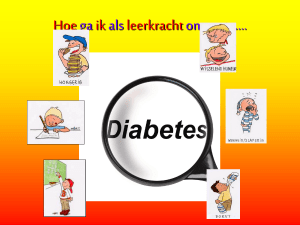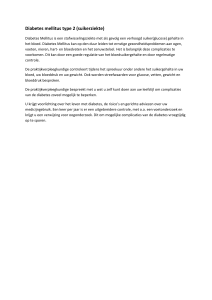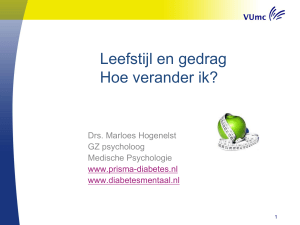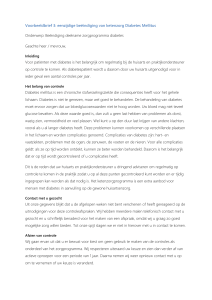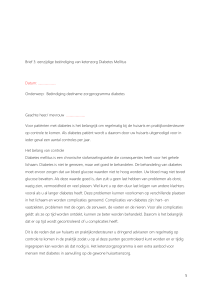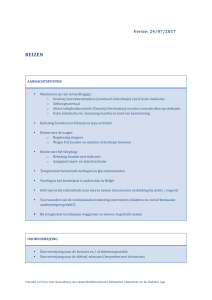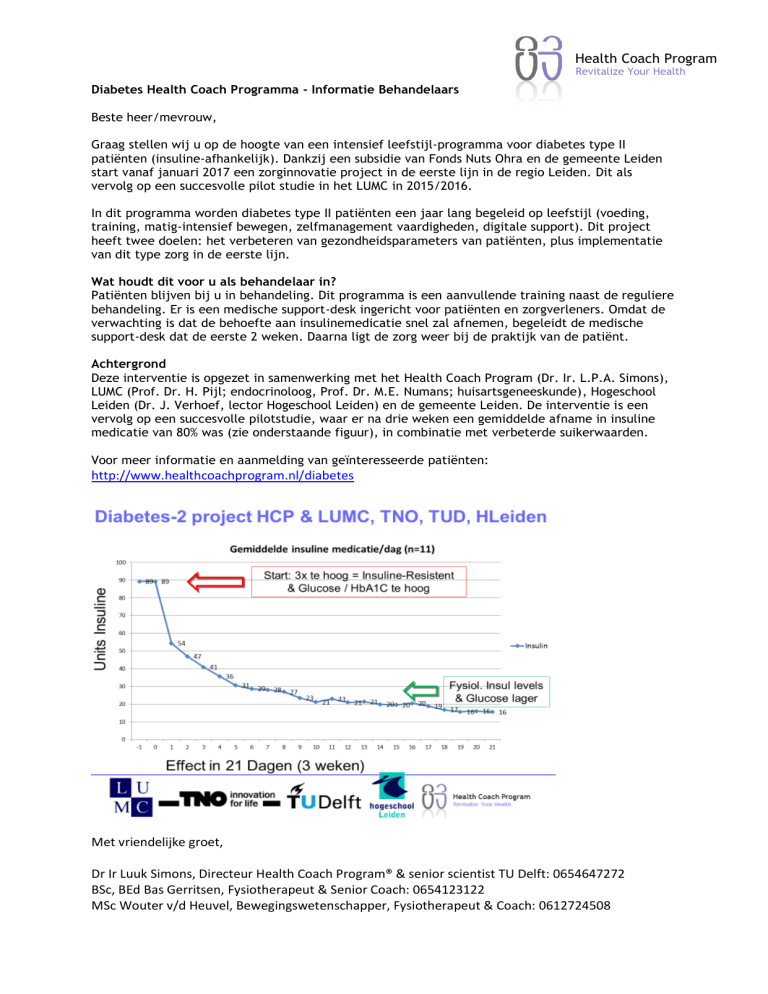
Health Coach Program
Revitalize Your Health
Diabetes Health Coach Programma - Informatie Behandelaars
Beste heer/mevrouw,
Graag stellen wij u op de hoogte van een intensief leefstijl-programma voor diabetes type II
patiënten (insuline-afhankelijk). Dankzij een subsidie van Fonds Nuts Ohra en de gemeente Leiden
start vanaf januari 2017 een zorginnovatie project in de eerste lijn in de regio Leiden. Dit als
vervolg op een succesvolle pilot studie in het LUMC in 2015/2016.
In dit programma worden diabetes type II patiënten een jaar lang begeleid op leefstijl (voeding,
training, matig-intensief bewegen, zelfmanagement vaardigheden, digitale support). Dit project
heeft twee doelen: het verbeteren van gezondheidsparameters van patiënten, plus implementatie
van dit type zorg in de eerste lijn.
Wat houdt dit voor u als behandelaar in?
Patiënten blijven bij u in behandeling. Dit programma is een aanvullende training naast de reguliere
behandeling. Er is een medische support-desk ingericht voor patiënten en zorgverleners. Omdat de
verwachting is dat de behoefte aan insulinemedicatie snel zal afnemen, begeleidt de medische
support-desk dat de eerste 2 weken. Daarna ligt de zorg weer bij de praktijk van de patiënt.
Achtergrond
Deze interventie is opgezet in samenwerking met het Health Coach Program (Dr. Ir. L.P.A. Simons),
LUMC (Prof. Dr. H. Pijl; endocrinoloog, Prof. Dr. M.E. Numans; huisartsgeneeskunde), Hogeschool
Leiden (Dr. J. Verhoef, lector Hogeschool Leiden) en de gemeente Leiden. De interventie is een
vervolg op een succesvolle pilotstudie, waar er na drie weken een gemiddelde afname in insuline
medicatie van 80% was (zie onderstaande figuur), in combinatie met verbeterde suikerwaarden.
Voor meer informatie en aanmelding van geïnteresseerde patiënten:
http://www.healthcoachprogram.nl/diabetes
Met vriendelijke groet,
Dr Ir Luuk Simons, Directeur Health Coach Program® & senior scientist TU Delft: 0654647272
BSc, BEd Bas Gerritsen, Fysiotherapeut & Senior Coach: 0654123122
MSc Wouter v/d Heuvel, Bewegingswetenschapper, Fysiotherapeut & Coach: 0612724508
Achtergrond Informatie: In-/Exclusie & Project Summary
Inclusie-criteria patiënten; voor dit project moet u:
- suikerziekte type 2 hebben met insuline therapie
- tussen de 30 en 80 jaar zijn
- een body mass index hebben > 25 kg/m2
- Nederlandse taal beheersen (vanwege coaching en groepssessies) en basis computervaardigheden
bezitten (voor gebruik van email en Internet dashboard)
Exclusie-criteria patiënten; u kunt niet deelnemen wanneer u:
- recent (< 3 maanden) een hartinfarct heeft gehad
- te hoge bloeddruk heeft (u mag wel medicijnen voor uw bloeddruk gebruiken!)
(bovendruk > 170 mmHg en/of onderdruk > 100 mmHg, 2 v/d 3 metingen)
- een chronische conditie naast suikerziekte hebt die deelname belet
(naar inschatting van de begeleiders)
- meer dan 28 alcoholische consumpties per week gebruikt, en niet bereid bent tot minderen
- een lage motivatie heeft voor deelname
(score 2 ‘laag’ of 1 ‘zeer laag op een 5-punt schaal)
- psychiatrische problemen hebt
METC PROJECT SUMMARY (Medisch-Ethische ToetstingsCommissie LUMC)
Introduction and rationale
Our Western lifestyle plays a large role in the onset and progression of diabetes mellitus type 2 (Lim
2011). Insulin resistance has an important role in creating a vicious circle, where medication needs
generally increase over time. Moreover, increasing blood glucose and insulin levels speed up the
processes of weight gain, insulin resistance, inflammation, aging and comorbidity (like CVD, kidney
failure , cancers, neuropathy and dementia) (Hotamisligil 2010). Hence, reducing insulin dependence
and insulin resistance can be seen as an important therapeutic goal. This can be achieved with
healthy lifestyle improvements.
Several lifestyle interventions have yielded improved outcomes in type 2 diabetes patients on insulin
therapy, most notably: lower blood sugar and lower medication needs (Jenkins 2008; Esposito 2009).
However, these are often highly controlled interventions. Moreover, the long-term sustainability of
behaviours is limited. The question is: can we do this on a more ‘Do-It-Yourself’ and e-Supported
basis? This would have two advantages. First, since behaviour improvements are implemented within
patients’ lives, it improves the chance of sustained health behaviour (Simons 2013). Second, it is
cheaper. Since 2010 the Health Coach Program has been used to improve lifestyle and metabolic
outcomes (including reduced insulin needs for diabetes-2 patients), via eSupport, improved selfmanagement and rapidly improved health behaviours (Simons 2010, Simons 2012). The intervention
combines improving health literacy with active behaviour change support.
Objectives
1.
To determine the robustness of an e-supported lifestyle coaching program within the first
line health care setting of the Leiden region
2.
To assess the effects of lifestyle support in patients with insulin dependent type 2 diabetes
mellitus after 10 weeks and after one year of follow up on:
a. Health behaviours, Health-Related Quality of life, and exercise capability.
b. Fasting glucose levels, and medication needs (insulin, metformin) [as monitored by
patients].
c. Progression/regression of kidney failure [as monitored within regular care].
Design
Non-randomized, one arm lifestyle intervention pilot project, 10 weeks, plus 1 year of follow up.
Study population
175 insulin-dependent Type 2 Diabetes Mellitus patients in the Leiden region.
Drugs and dosages
No investigational drugs will be used.
Outcomes
Impacts on healthy lifestyle behaviors, measured with BRAVO [standardized survey], on
Health Related Quality of Life [RAND SF-8 survey] and exercise capability (aerobic &
resistance tests).
Fasting plasma glucose, HbA1C, total cholesterol, HDL cholesterol and triglyceride levels,
blood pressure, BMI [as monitored within standard first line diabetes-2 care]
Kidney function: Albumin/Creatinin Ratio. [as monitored within standard first line diabetes
care]
Medication requirements (insulin, metformin, statins, antihypertensives)
These measurements will be conducted at baseline after 10 weeks and at 1 year follow up. The
project team is responsible for the surveys and exercise capability tests. Monitoring of biometrics
and medication requirements is part of the standard first line diabetes-2 care.
Methods
eSupported Lifestyle Intervention
An extensive eSupported lifestyle program is offered, which combines coach sessions with electronic
dashboarding and self-management, plus electronic health tips and a digital health quiz game.
Intensive coaching is offered for 5 weeks with the purpose of generating self-propelling behaviours
and capabilities. The support in weeks 6-10 is increasingly aimed at fostering self-management, and
includes group sessions at the end of weeks 7 and 10, weekly electronic tips and a digital health
game. For the rest of the year a more light weight support program is offered, with 2-monthly group
sessions, plus monitoring of physical activity patterns.
The lifestyle advice follows the guidelines of the Harvard Epidemiology and Nutrition Group for
nutrition and physical activity, with specific modifications for diabetics. The guidelines are to increase
intake of vegetables and low sugar fruits (each 2,5 servings/day or more), to choose whole grains
instead of refined grains, to limit sugar and other high glycemic load foods, to have one daily serving
of nuts and/or legumes, to limit intake of red meat and processed meat, to limit intake of trans and
animal fats, and to have no more than 2 (male) or 1 (female) alcoholic beverages/day. Physical
exercise guidelines are: at least 60 min/day moderate intensity activity (like walking or gardening)
and at least 3x30 min/week intensive activity (Borg level 12-14).



